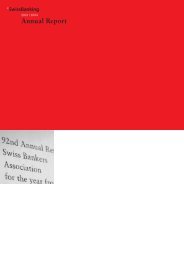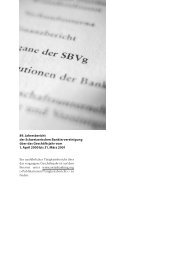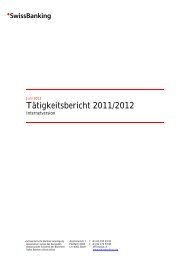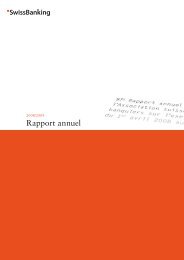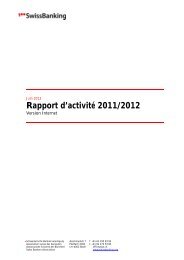Allocation Directives for the New Issues Market - SwissBanking
Allocation Directives for the New Issues Market - SwissBanking
Allocation Directives for the New Issues Market - SwissBanking
You also want an ePaper? Increase the reach of your titles
YUMPU automatically turns print PDFs into web optimized ePapers that Google loves.
<strong>Allocation</strong> <strong>Directives</strong> <strong>for</strong> <strong>the</strong> <strong>New</strong> <strong>Issues</strong> <strong>Market</strong><br />
<strong>Directives</strong> governing <strong>the</strong> allocation of equity-related securities offered by way of a<br />
public offering in Switzerland<br />
(2.6.04, Translation)<br />
A. Purpose<br />
1. Involved parties in public offerings and public placements (jointly referred to as<br />
“Public Offerings”) in <strong>the</strong> capital market are typically:<br />
• <strong>the</strong> issuer or <strong>the</strong> selling owner of <strong>the</strong> securities (jointly referred to as “<strong>the</strong><br />
issuer“),<br />
• <strong>the</strong> (potential) subscribers (institutional and private clients),<br />
• <strong>the</strong> banks or securities dealers (as lead managers, syndicate banks and thirdparty<br />
banks, jointly referred to as “banks”)<br />
• <strong>the</strong> community of market participants.<br />
2. By stating <strong>the</strong> requirements in terms of objectivity and lucidity, <strong>the</strong> purpose of <strong>the</strong>se<br />
<strong>Directives</strong> is to ensure highest standards of fairness and transparency in <strong>the</strong> allocation<br />
process, while taking <strong>the</strong> interests of <strong>the</strong> above mentioned parties (Point 1 above) into<br />
account.<br />
Commentary: Fair treatment of clients has to be warranted within <strong>the</strong> different groups of clients<br />
(see also Points 6.3 and 7).<br />
3. These <strong>Directives</strong> represent a professional code of conduct and do not affect <strong>the</strong><br />
relationship under civil law between banks and <strong>the</strong>ir clients.<br />
B. Scope of Application<br />
4. These <strong>Directives</strong> govern all public offerings of shares, participation certificates and<br />
dividend-right certificates, as well as convertible bonds and bonds cum warrant offered<br />
in Switzerland.<br />
5. These <strong>Directives</strong> are applicable to all banks domiciled in Switzerland, including branch<br />
offices and subsidiaries of <strong>for</strong>eign banks that engage in public offerings in Switzerland.<br />
The latter may not circumvent <strong>the</strong>se <strong>Directives</strong> by resorting to <strong>the</strong> banking and financial<br />
services of <strong>the</strong>ir head-offices and parent companies, branch offices and subsidiaries<br />
outside Switzerland. These <strong>Directives</strong> are not effective on a global scale.
2<br />
C. Principles<br />
General<br />
6.1 The bank must regulate and document <strong>the</strong> allocation procedure <strong>for</strong> IPOs in a<br />
manner which ensures that <strong>the</strong> procedure:<br />
• is based on objective criteria,<br />
• can be verified by <strong>the</strong> bank’s competent bodies and employees,<br />
• is transparent to <strong>the</strong> bank’s licensed auditors and <strong>the</strong> supervisory authorities.<br />
6.2 The details of <strong>the</strong> allocation procedure may take into account an abridged time<br />
frame (e.g. to accommodate <strong>the</strong> shorter time windows in <strong>the</strong> case of convertible bonds<br />
and bonds cum warrant), subject to <strong>the</strong> principles stipulated in Point 6.1.<br />
6.3 Various clients or client groups may treated in a different way within a set of<br />
reasonable interest parameters (see also Point 7).<br />
6.4 There is no legal claim to an allocation.<br />
6.5 <strong>Allocation</strong>s against <strong>the</strong> promise of certain considerations are deemed prejudiced and<br />
are <strong>the</strong>re<strong>for</strong>e prohibited; such considerations including in particular:<br />
• <strong>the</strong> pledge to purchase more securities after <strong>the</strong> placement in <strong>the</strong> market<br />
(“laddering”),<br />
• <strong>the</strong> payment of special commissions or commission premiums (“quid pro quo<br />
agreements”),<br />
• <strong>the</strong> pledge or specific offer of business orders or propositions to <strong>the</strong> allocating<br />
bank (“spinning”).<br />
<strong>Allocation</strong>s to Private Investors<br />
7. The bank has to provide fair and impartial treatment to private investors in <strong>the</strong><br />
allocation process, any differing treatment of individual private investors vis-à-vis o<strong>the</strong>rs<br />
may occur solely on <strong>the</strong> basis of objective reasons. <strong>Allocation</strong> procedures that warrant a<br />
fair and impartial treatment of private investors are based in particular on <strong>the</strong> objective<br />
criteria listed below, or combinations <strong>the</strong>reof:<br />
• casting a lot, i.e, random allocations<br />
• size of order<br />
• proportion of subscriptions<br />
• time of subscription order<br />
• subscription rate offers (in <strong>the</strong> case of an auction)<br />
• regional aspects<br />
• long-term commitment to <strong>the</strong> issuer<br />
• investors’ portfolio structure<br />
• <strong>the</strong> bank’s improved quality, position and placement power in <strong>the</strong> private<br />
investors‘ medium and long-term interest<br />
• <strong>the</strong> issuer’s wishes with regard to investor profile<br />
• length of client relationship<br />
• o<strong>the</strong>r objective criteria.
3<br />
Option <strong>for</strong> Overallotment<br />
8. If <strong>the</strong> prospectus stipulates an overallotment option (“green shoe”), it must provide<br />
in<strong>for</strong>mation about <strong>the</strong> parties to <strong>the</strong> agreement, <strong>the</strong> volume and <strong>the</strong> maturity of <strong>the</strong><br />
overallotment.<br />
<strong>Allocation</strong> at <strong>the</strong> Issuer’s Request<br />
9. Separate allocations at <strong>the</strong> issuer’s request to groups of subscribers with a special<br />
relation to <strong>the</strong> issuer are permitted; such groups may comprise business partners<br />
(private individuals or legal entities), <strong>the</strong> issuer’s management or staff (“friends-andfamily<br />
programmes”). The prospectus has to disclose <strong>the</strong> fact of any such exclusive<br />
allocation and specify <strong>the</strong> maximum allocation quota as well as <strong>the</strong> groups of parties<br />
entitled to such allocations.<br />
<strong>Allocation</strong> to Nostro Account<br />
10.1 Syndicate banks may allocate a reasonable stake of a public offering to <strong>the</strong>ir nostro<br />
account (own holdings or trading portfolio, notably <strong>for</strong> <strong>the</strong> purpose of market making,<br />
stabilisation or <strong>for</strong> o<strong>the</strong>r objective reasons). Such allocations are subject to a prior<br />
arrangement with <strong>the</strong> issuer.<br />
Commentary: The definition of a reasonable stake in terms of allocation to <strong>the</strong> nostro account<br />
depends, <strong>for</strong> example, on <strong>the</strong> liquidity requirement during <strong>the</strong> initial trading days, <strong>the</strong><br />
underwriting volume and its quality or <strong>the</strong> size of <strong>the</strong> transaction.<br />
10.2 If a syndicate bank is unable to place its commitment in full due to a lack of<br />
investor demand, <strong>the</strong> bank may hold <strong>the</strong> securities in its nostro account or sell <strong>the</strong>m in<br />
<strong>the</strong> market (subject to contrary arrangements with <strong>the</strong> issuer or selling security holders).<br />
10.3 Third-party banks must not make unjustified preferential allocations to <strong>the</strong>ir nostro<br />
accounts vis-à-vis <strong>the</strong>ir clients. In any case, <strong>the</strong> allocation to nostro must be reasonable.<br />
<strong>Allocation</strong> Result<br />
11. After close of <strong>the</strong> transaction <strong>the</strong> lead manager has to disclose <strong>the</strong> volume of <strong>the</strong><br />
public offering, and if applicable, <strong>the</strong> size of allocations to groups of subscribers with a<br />
special relation to <strong>the</strong> issuer (Point 9) as well as any exercise of <strong>the</strong> overallotment option<br />
(Point 8).
4<br />
D. General Requirements and Supervision<br />
12. A bank that participates in public offerings has to be professionally organised,<br />
commensurate to <strong>the</strong> size of its operation.<br />
13. The bank has to establish <strong>the</strong> necessary internal rules and take appropriate measures<br />
to ensure compliance with <strong>the</strong>se <strong>Directives</strong>.<br />
14. The Board of Directors of <strong>the</strong> Swiss Bankers Association passed <strong>the</strong>se <strong>Directives</strong> on<br />
29 th March 2004 and <strong>the</strong> Federal Banking Commission approved <strong>the</strong>m as a binding<br />
supervisory minimal standard on 27 th May 2004. These <strong>Directives</strong> enter into <strong>for</strong>ce on<br />
1 st January 2005.







